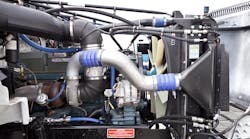Brand loyalty is an interesting phenomenon based on a combination of reality and perception. Customers have a positive feeling toward a brand and continue to purchase it rather than consider other brands that might be just as good or better. Brand loyalty does not happen overnight; it's based on repeated positive experiences with a particular product from a particular manufacturer.
Once a person becomes loyal to a brand, they may stubbornly continue to purchase that brand even if it is no longer delivering on its promise or when there may be better options available. When it comes to truck parts, fleets’ brand loyalty can be based on a variety of things, including warranty reimbursement, vehicle age, safety, durability, etc.
For their newer trucks, fleets often stick with the OEM or tier 1 supplier brands, but as trucks age, brand loyalty becomes less of a factor. That is probably due in part to the fact that the OE and tier 1 part likely comes with a higher price tag.
See also: Get creative in your parts acquisition strategy
The type of part likely plays a role in brand loyalty. When it comes to more critical parts—engine, transmission and emission related/aftertreatment parts—fleets tend to stick with the OE brand. For other types of parts, fleets seem more willing to consider parts beyond the OEM.
Choosing whether to stick with an OEM branded part or opting for an aftermarket part, all makes part, or private label part is based on a variety of factors. For most fleets, safety is a top concern, so they will not knowingly accept parts from anyone other than the OE brands.
Lots of fleets have gotten burned by parts deals that seemed too good to be true. They found out that the part did not live up to their quality standards. Of course, it's not always possible to tell whether a part is genuine or counterfeit. Counterfeiters have gotten quite adept at copying the part right down to the packaging. The best way for fleets to protect themselves from substandard parts is to do business with a reputable supplier.
Whether the fleet is doing business with a dealer, distributor, or online parts seller, it's important to vet the supplier to make sure the parts you are ordering are the parts you actually will be getting and will not be substitutes. If you want a particular brand, that is what you should get, and substitutions should not be made without your approval.
However, given the current supply chain issues, fleet managers may have to be more flexible when it comes to their brand loyalty. Getting the truck back on the road may have to take precedence over your preferred brand. When (if) parts once again became readily available, fleets will have the luxury of returning to the brands they have been loyal to for years. On the other hand, the current shortage may lead to new loyalties and new preferred brands.
David Seewack is the founder and CEO of FinditParts. Seewack is focused on transforming how heavy-duty truck and trailer parts are bought and sold. Founded in 2010, FinditParts is the No. 1 supplier of these parts online, with more than 10 million SKUs available from more than 1,800 manufacturers and customers in over 210 countries.




